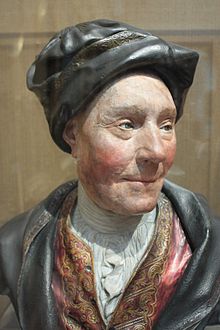Colley Cibber
| Colley Cibber | |
|---|---|

Colley Cibber c.1740, painted plaster bust, National Portrait Gallery, London
|
|
| Born |
6 November 1671 Southampton Street, London, England |
| Died | 11 December 1757 (aged 86) Berkeley Square, London, England |
| Occupation | actor, theatre manager, playwright, poet |
| Known for | Works include his autobiography and several comedies of historical interest Appointed Poet Laureate in 1730 |
Colley Cibber (6 November 1671 – 11 December 1757) was an English actor-manager, playwright and Poet Laureate. His colourful memoir Apology for the Life of Colley Cibber (1740) describes his life in a personal, anecdotal and even rambling style. He wrote 25 plays for his own company at Drury Lane, half of which were adapted from various sources, which led Robert Lowe and Alexander Pope, among others, to criticise his "miserable mutilation" of "crucified Molière [and] hapless Shakespeare". He regarded himself as first and foremost an actor and had great popular success in comical fop parts, while as a tragic actor he was persistent but much ridiculed. Cibber's brash, extroverted personality did not sit well with his contemporaries, and he was frequently accused of tasteless theatrical productions, shady business methods, and a social and political opportunism that was thought to have gained him the laureateship over far better poets. He rose to ignominious fame when he became the chief target, the head Dunce, of Alexander Pope's satirical poem The Dunciad.
Cibber's poetical work was derided in his time, and has been remembered only for being poor. His importance in British theatre history rests on his being one of the first in a long line of actor-managers, on the interest of two of his comedies as documents of evolving early 18th-century taste and ideology, and on the value of his autobiography as a historical source.
Cibber was born in Southampton Street, in Bloomsbury, London. He was the eldest child of Caius Gabriel Cibber, a distinguished sculptor originally from Denmark. His mother, Jane née Colley, came from a family of gentry from Glaston, Rutland. He was educated at the King's School, Grantham, from 1682 until the age of 16, but failed to win a place at Winchester College, which had been founded by his maternal ancestor William of Wykeham. In 1688, he joined the service of his father's patron, Lord Devonshire, who was one of the prime supporters of the Glorious Revolution. After the revolution, and at a loose end in London, he was attracted to the stage and in 1690 began work as an actor in Thomas Betterton's United Company at the Drury Lane Theatre. "Poor, at odds with his parents, and entering the theatrical world at a time when players were losing their power to businessmen-managers", on 6 May 1693 Cibber married Katherine Shore, the daughter of Matthias Shore, sergeant-trumpeter to the King, despite his poor prospects and insecure, socially inferior job.
...
Wikipedia
